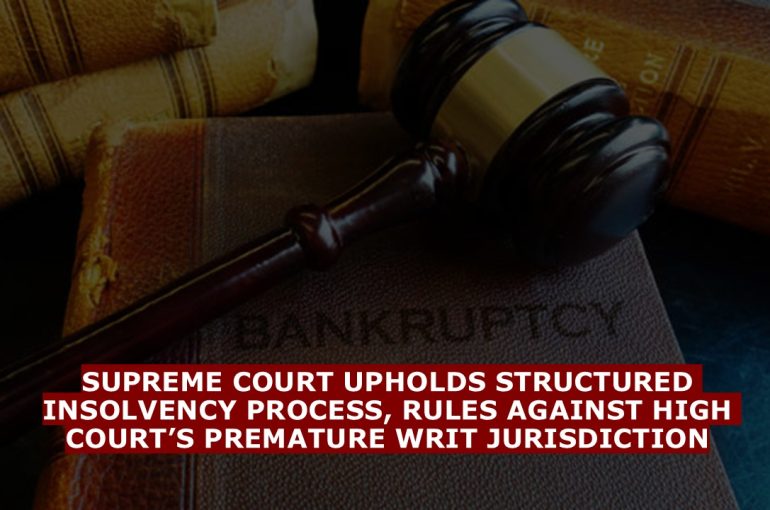SUPREME COURT UPHOLDS STRUCTURED INSOLVENCY PROCESS, RULES AGAINST HIGH COURT’S PREMATURE WRIT JURISDICTION
The Judgment in the Case of Bank of Baroda v. Farooq Ali Khan & Ors (Civil Appeal No. 2759 of 2025, arising out of SLP (C) No. 18062 of 2024.) delivered by a Division Bench of the Supreme Court of India, comprising Hon’ble Justice Pamidighantam Sri Narasimha and Justice Manoj Misra on February 20, 2025. This Judgment discusses the validity of personal insolvency proceedings against a guarantor under the IBC, 2016, and the High Court’s premature interference under Article 226. The Supreme Court upheld the structured process under the IBC and reinstated the insolvency proceedings.
Brief Facts of the Case:
Respondent No. 1, Farooq Ali Khan, was a promoter and director of Associate Décor Limited (corporate debtor). The corporate debtor took multiple loans from a consortium of banks, including the Appellant, Bank of Baroda. On 10.07.2014, Respondent No. 1 executed a personal guarantee for these loans. Due to defaults in payments, a Corporate Insolvency Resolution Process (CIRP) was initiated against the corporate debtor, and the Appellant invoked the personal guarantee, demanding Rs. 244 crores from the guarantors, including Respondent No. 1. The Respondent offered Rs. 25 crores as a full and final settlement, which was not accepted.
Subsequently, the Appellant issued a Demand Notice under Rule 7(1) of the Insolvency and Bankruptcy (Application to Adjudicating Authority for Insolvency Resolution Process for Personal Guarantors to Corporate Debtors) Rules, 2019, and filed an application under Section 95(1) of the Insolvency and Bankruptcy Code, 2016 (IBC), to initiate personal insolvency proceedings against Respondent No. 1. The Adjudicating Authority, by Order dated 16.02.2024, appointed a resolution professional to examine the application and submit a report under Section 99 of the IBC.
Respondent No. 1 challenged this before the High Court under Article 226 of the Constitution, arguing that his liability as a personal guarantor had been waived. The High Court allowed the writ petition and held that the personal insolvency proceedings were not maintainable. The Adjudicating Authority, in compliance with the High Court’s Order, disposed of the insolvency proceedings on 19.06.2024. The present appeal was filed against the High Court’s judgment.
Issues:
- Whether the High Court correctly exercised its writ jurisdiction under Article 226 to interdict the personal insolvency proceedings against Respondent No. 1.
- Whether the liability of Respondent No. 1 as a personal guarantor was waived.
- Whether the Adjudicating Authority followed the correct procedure under Sections 95 to 100 of the IBC in appointing a resolution professional and directing the submission of a report.
Contentions:
Appellant (Bank of Baroda):
- The High Court’s interference at the preliminary stage was premature, as the Adjudicating Authority had merely appointed a resolution professional to examine the application under Section 99 of the IBC.
- The statutory scheme under Sections 95 to 100 of the IBC provides for a structured process wherein the resolution professional first examines the application before any adjudication takes place.
- The High Court’s decision precluded the statutory mechanism from being followed and wrongly adjudicated on the existence of the debt, which is a mixed question of law and fact reserved for the Adjudicating Authority.
Respondent No. 1 (Farooq Ali Khan):
- His liability as a personal guarantor had been waived, and therefore, the initiation of personal insolvency proceedings against him was not justified.
- The High Court had the jurisdiction to examine whether the insolvency application was maintainable before the Adjudicating Authority.
- The decision in Dilip B. Jiwrajka v. Union of India (2024) 5 SCC 435, relied upon by the Adjudicating Authority, was distinguishable as it did not pertain to cases where the application itself was not maintainable.
Supreme Court
The Supreme Court held that the High Court incorrectly exercised its writ jurisdiction under Article 226. The statutory scheme under the IBC requires that the resolution professional first examine the application and submit a report under Section 99 before the Adjudicating Authority which decides on the application’s admission under Section 100. By interfering at a premature stage, the High Court bypassed this statutory mechanism and decided on issues that were within the Adjudicating Authority’s domain.
The Supreme Court reiterated the principles established in Jiwrajka (supra), holding that:
- No judicial adjudication occurs at the stage of appointing a resolution professional under Section 97.
- The Adjudicating Authority need not determine jurisdictional facts before appointing the resolution professional.
- Judicial determination occurs only when the Adjudicating Authority considers the resolution professional’s report under Section 100.
Since the Adjudicating Authority had followed the statutory procedure, the Supreme Court set aside the High Court’s judgment and restored the insolvency proceedings against Respondent No. 1 before the Adjudicating Authority, reinstating its Order dated 16.02.2024.
Baddam parichaya Reddy
The Indian Lawyer & Allied Services
Associate
Please log on to our YouTube channel, The Indian Lawyer Legal Tips, to learn about various aspects of the law. Our latest video, titled; “Special Law Vs. General Law” can be viewed at the link below:





































Leave a Reply